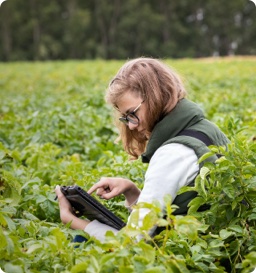Have you always respected the environment and the fish and wildlife that call it home? Then a career preserving their habitat might be right for you – and it starts in the Renewable Resource Management program. This intensive two-year diploma program is focused on biology and primarily deals with fish and wildlife.
Textbook theory will come to life as you trek out into fields, forests, lakes and rivers to study animals and their environment, learning how to preserve their habitat for generations to come. You’ll be fully engaged in small classes taught by enthusiastic instructors who are recognized experts in the field.
Apply Now Grab and Go Information
Career Opportunities
Our diploma program will prepare you for work in a wide variety of environmental and natural resource management career opportunities, including employment as:
- Biological Technician
- Environmental Technician
- Field Research Technician
- Resource Management Technician
Employment is found with government agencies, private environmental organizations, environmental (non-governmental) consulting firms, and natural resource industries (oil, gas, mining, and forestry).
Visit ALIS website for more career information.
Student Feature: Ednna Stobschinkski
1st
The Renewable Resource Management program is the first step toward becoming a Registered Technologist in Biology, meeting all the criteria needed for Biological Technologist in Training
100+ specimens
in the Hubbard Collection, one of Canada’s largest collections of full-body taxidermy mammals
Transfer
into Lethbridge College’s Bachelor of Ecosystem Management degree program
At-a-Glance
Starts-in
September
Credential / Accreditation
Diploma
Duration
2 years
Dates and Deadlines
Visit the Program Application Status page for more details.
Academic Centre
Program Availability
Admissions
This program is available for International Students.
New applicants are accepted into the Renewable Resource Management two-year diploma program for the Fall term (September) only.
General Admissions Requirements
All applicants must meet the general admission requirements for Lethbridge College programs, as indicated in the Admission section of this calendar.
Academic Requirements
In addition to meeting the general admission requirements indicated in the Admission section of this calendar, applicants to this program must also satisfy the following specific course requirements (or equivalencies):
- Grade 11 Biology
- Grade 11 Chemistry
- Grade 12 Math (equivalent to Alberta’s Math 30-2 or a higher level Math)
Basic computer literacy in the use of the Internet, e-mail, word processing, and fundamental processes of spreadsheets is required for the student to be successful in this program. Students lacking these skills are strongly urged to complete a basic computer literacy course prior to entering this program.
Employers often require that students hold a valid Standard First Aid or Wilderness First Aid Certificate and/or a CPR Certificate to be eligible for seasonal and/or permanent employment. Students are encouraged to obtain these certificates either prior to entering the program or during the first term.
Upon successful completion of all program requirements, students are awarded a Renewable Resource Management diploma.
Interested students can obtain further information on these partnerships from the School of Environmental Science Chair. Students wishing to continue studies at other institutions must meet the entrance requirements of that institution.
Athabasca University
Graduates of Lethbridge College's Renewable Resource Management diploma program are eligible to receive 30 to 60 credits (dependent on the university program) towards a number of post-diploma bachelor's degrees in Commerce, Management, Human Resources/Labour Relations, Computer and Information Systems, and Science at Athabasca University. To explore options, please visit www.athabascau.ca
Griffith University, Australia
Graduates of Lethbridge College's Renewable Resource Management diploma program are eligible to receive transfer credit towards the completion of a Bachelor of Environmental Science at Griffith University, in Australia. For more information, please visit https://www.griffith.edu.au/credit
Lethbridge College
Graduates of Lethbridge College's Renewable Resource Management Diploma will be accepted directly into the Bachelor of Ecosystem Management. A minimum GPA of 2.00 or equivalent is required for admission.
Graduates of Lethbridge College's Renewable Resource Management Diploma, who have completed the required Bridging Courses, may be eligible for acceptance into the Bachelor of Applied Science in Conservation Enforcement at Lethbridge College. A minimum GPA of 2.00 or equivalent is required for admission.
Northern Alberta Institute of Technology (NAIT)
Graduates of Lethbridge College's Renewable Resource Management diploma program with a minimum GPA of 2.7, or a B- grade, on standard grading scales will be conditionally accepted into the BTech (Bachelor of Technology) degree program. Applicants for transfer of credit shall complete all of the requested application procedures of NAIT including, but not limited to, written statements outlining personal objectives, career goals, letters of reference, work experience and community involvement, and such other information as may be requested and used by NAIT to determine whether the applicant complies with the requirements as set out or intended.
Royal Roads University
Graduates of Lethbridge College's Renewable Resource Management diploma program are eligible for full block transfer into the Bachelor of Science in Environmental Practice or the Bachelor of Arts in Environmental Practice at Royal Roads University. Graduates may also receive full block transfer to the Bachelor of Science in Environmental Science, with the completion of two additional university-level math courses (calculus or linear algebra preferred) and two additional university-level chemistry courses on arrival.
University of Alberta
Graduates of Lethbridge College's Renewable Resource Management diploma program are eligible to receive up to 60 credits towards a Bachelor of Science (Environmental and Conservation Sciences), Land Reclamation major at the University of Alberta. In order to receive the total allowable credits, students must present all diploma program requirements.
University of Lethbridge
Graduates of Lethbridge College’s Renewable Resource Management diploma program with a minimum 2.75 GPA are eligible for admission into the University of Lethbridge's Post-Diploma Bachelor of Science (Environmental Science) program. Admitted students will be third-year degree level students in the university's Faculty of Arts and Science in all respects. For more information, please see an academic advisor and visit www.uleth.ca
University of Regina
Lethbridge College's Renewable Resource Management diploma graduates are eligible to receive up to 60 credits towards the Bachelor of Science (Environmental Biology) at the University of Regina. Students must have a minimum graduating average 60% and a passing grade in Pre-Calculus 30 or equivalent. For more information, please visit http://urconnected.uregina.ca/
Take a Viewbook
Need more information about Lethbridge College? Browse our viewbook for more details about programs, awards and scholarships, student life and more!
Download viewbook

Delivery Formats
The Renewable Resource Management program is delivered through an on-campus format.
Hyflex with In-Person Labs
This program is offered both online and on campus in a synchronous format (learning occurs at the same time) that allows lectures to be delivered in-person or through a hyflex approach as needed. All labs take place in-person on campus in Lethbridge.
On Campus
This program is delivered in a face-to-face format on the main Lethbridge College campus. Lectures, labs and hands-on training opportunities will all take place on campus in Lethbridge.
Courses
| Course | Title | Credits |
|---|---|---|
| Year 1 | ||
| Term I | ||
| BIO-1167 | Botany 1 | 3 |
| BIO-1168 | Zoology 1 | 3 |
| RRM-1197 | Spatial Information Techniques 1 | 3 |
| RRM-2252 | Water Resources 1 | 3 |
| STS-1155 | Descriptive Statistics | 3 |
| Credits | 15 | |
| Term II | ||
| BIO-1170 | Plant Systematics 1 | 3 |
| BIO-1172 | Ecology 1 | 3 |
| ENG-1150 | Composition | 3 |
| GEO-1166 | Physical Geology 1 | 3 |
| RRM-2253 | Soil Resources 1 | 3 |
| Credits | 15 | |
| Year 2 | ||
| Term I | ||
| LAW-1150 | Introduction to Environmental Law | 3 |
| RRM-2256 | Rangeland Management 1 | 3 |
| RRM-2258 | Principles of Wildlife Biology 1 | 3 |
| RRM-2259 | Principles of Fishery Science 1 | 3 |
| RRM-2298 | Conservation Biology | 3 |
| Credits | 15 | |
| Term II | ||
| GEO-1165 | Geographic Information Systems | 3 |
| RRM-2264 | Forest Management 1 | 3 |
| RRM-2291 | Wildlife Habitat Management 1 | 3 |
| RRM-2293 | Fish Habitat Management 1 | 3 |
| RRM-2299 | Fire Management 1 | 3 |
| Credits | 15 | |
| Total Credits | 60 | |
1 Indicates courses with a field study component
Special note about field studies: Students are off-campus completing field studies during most of September and April. Due to scheduling conflicts it is extremely difficult to take Year 1 and Year 2 courses simultaneously.
Students are advised to complete all Year 1 courses before proceeding to Year 2, and all Year 2 courses before enrolling in Year 3 courses (for related post-diploma certificate or degree programs).
In the Fall term, field studies are in September, while in the Winter term, field studies are scheduled in April. Field studies schedules are dependent on many variables and may require students to participate on weekends. All program field studies are mandatory.
Students will be expected to complete non-credit environmental field techniques courses as part of the requirement to complete the program. Courses such as bear safety, firearms safety, pleasure craft operator’s card and boat operations will occur as part of field trip season activities. Students will be responsible for the fees associated with these courses. Prior valid training possessed by students will be considered for recognition.
Tuition and Fees
| Title | Tuition | Fees | Books/Supplies |
|---|---|---|---|
| Year 1
|
$4,875.00
|
$1,723.00
|
$1,300.00
|
| Year 2
|
$5,355.00
|
$1,723.00
|
$900.00
|
| Title | Tuition | Fees | Books/Supplies |
|---|---|---|---|
| Year 1
|
$14,475.00
|
$1,723.00
|
$1,300.00
|
| Year 2
|
$15,491.00
|
$1,723.00
|
$900.00
|
Costs for supplies may vary considerably depending on what students already have or where they purchased their supplies; cost provided is on the moderately high end.
Students will be charged a medical/dental benefit fee unless they opt out by demonstrating alternative coverage prior to the end of the first week of class.
Students are responsible for the cost of the field trips relating to this program.
Supplies for Field Studies
Students on field studies are expected to provide their own equipment and supplies. This may include:
- 30 cm metric steel ruler
- adequate clothing for cold/wet weather
- backpack for gear
- binoculars
- field equipment vest (recommended)
- food
- hiking boots
- orienteering compass
- sunscreen
- safety glasses
- water bottle
- warm sleeping bag
- work gloves
- “write-in-the-rain” treated field notebook/surveyors book
Equipment and supplies may not be required in all courses or terms. Please consult the course outlines for specific equipment required before purchasing. Field studies schedules are dependent on many variables and may require students to participate on weekends. All program field studies require mandatory attendance.
Other Required Supplies
Available from Lethbridge College Bookstore:
- 16x hand lens
- dissection kit
- lab coat
- metric triangular scale with 1:1, 1:2, 1:5, 1:10, 1:20 and 1:50 graduations
- safety glasses
- “write-in-the-rain” field notebook/surveyors book
Available from sporting, hardware and office supply stores:
- 4 GB or higher USB memory stick
- 12 or more coloured pencils (pencil crayons)
- 30 cm metric steel ruler
- binoculars (8X40 or 10X50 magnification)
- chest waders (rubber soled)
- clipboard
- Nexus Type 115 or Silva Ranger compass (with declination adjustment screw)
- scientific calculator ($15-$30 range)
For additional information concerning lab or field equipment, contact the lab coordinator at 403.320.3202 ext. 5594.
Our Budget Wizard is a free self-service tool that can help you make sense of your finances and the cost of your education. Give it a try!
Contact us
This program belongs to the
Centre for Technology, Environment & Design
Featured Graduates

Diandra Bruised Head
“In nature, if a species is at risk you don’t just write it off, you look to improve its habitat. The people, my people, in the Blood Nations are at risk. I’m trying to improve their habitat so they can thrive. Better the environment, better the people. There is an old saying that resonates with me, ‘When the last tree is cut down, the last fish eaten and the last stream poisoned, you will realize that you cannot eat money.’ Saahkomiitapii (our earth being) and the many beautiful resources it shares with us are not a business, and we need to pay our respects.”

Randy Woroniuk
“The reason I went to Lethbridge College was because it had the best program. The college experience gave me footing, and I had a fantastic career as a natural resource officer for 32 years. Our environment is very important, and throughout my career, I always felt I was protecting our natural resources for future generations. We need people to look after it, and I was one of those people fortunate enough to have a career doing that. I talked with my sons a lot about what I learned at the college and my boys said, ‘this is the place to go!’ I encouraged them to leave home and experience the world on their own, and Lethbridge College was the perfect venue to do it because of the welcoming nature of the school and the people. I’m very proud of them.”

Erinn Shirley
“I wanted to be outside, in the mountains, hiking all day. It seemed like the kind of career where you do that and not feel like you are working. I learned so much about our natural resources and about life at Lethbridge College. It was there that I learned that I wanted to focus on wildlife biology.”
Scholarships
With just one online application, you can apply for all the Lethbridge College awards and scholarships for which you qualify, including these featured scholarships: